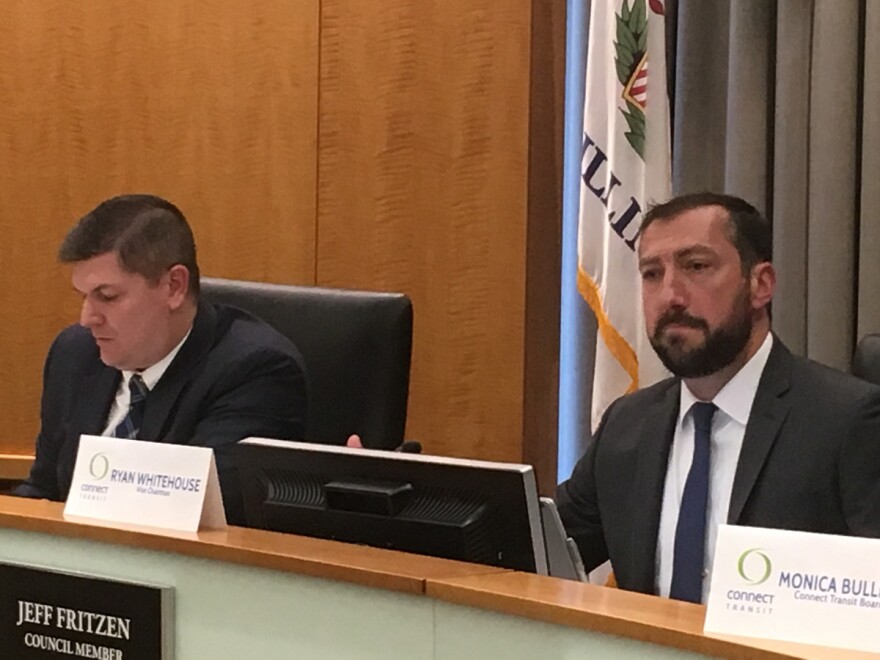Connect Transit has approved higher fares to help pay for the transportation service, but will delay implementing them for three months to seek additional funding.
The Board of Trustees voted 5-1 Tuesday to implement the new rate structure for fixed routes and Connect Mobility starting Oct. 1. The panel also voted 5-1 to eliminate its Olive route among a series of route changes that will take effect July 1.
Board member Ryan Whitehouse proposed delaying the new fares that staff had proposed to start July 1.
Before the vote, more than 20 people spoke at a public hearing against the proposal, urging the board either to curtail the rate increases, restore or bolster the Olive route or seek additional revenue.
“I hear these stories,” Whitehouse told the gathering of nearly 50 people in the Normal Town Council chambers, where the meeting was moved to accommodate the larger audience. “Anyone on this board hears them. They pull at your heart. I think it’s really hard to hear them and not take them seriously.
“We are just pushing back the date because if we can’t find other resources, we have to implement new ways to pay for the service,” he said.
The board is raising the fixed-route fare from $1 per ride to $1.25 and gradually increasing the rate to $1.50 by July 2022.
Connect Mobility, its on-demand service for riders with disabilities, will rise from $2 to $2.50 in October and raise to $3 by 2022. The board eliminated its 30-day pass for Connect Mobility. It is now offering a value card which offers discounts of 5 to 15 percent for fares ranging between $25 and $100.

Heidi Zimmerman, who owns and operates Self Directed Supports, an agency that provides support to residents with developmental disabilities, told the board that’s too much for the poorest and most vulnerable people in the community to afford.
“Punishing people who already face so many struggles in their day-to-day life is absolutely not acceptable,” she said.
General manager Isaac Thorne said Connect Transit anticipated $95,000 in additional revenue next year from the higher fares and an average of $118,750 over the next four years, but that would be reduced under the delayed implementation. He said the agency would need at least an additional $100,000 in financial commitments from other sources to consider reversing the rates hikes.
At a time of tight budgets and Bloomington recently passing a 4-cent increase in the gas tax, Thorne said it’s hard to say if there’s additional revenue for public transit.
“I don’t know and I think that’s why the board was very cautious, saying we are going to have those conversations,” he said. “We don’t know what those outcomes are going to be, but we can at least delay (the higher fares) until Oct. 1 to have this conversation and see what happens."
Connect Transit is already partially subsidized by Bloomington, Normal and the federal government.
“Our expenses go up as well, so it’s necessary for us to try to figure out how we can continue to run this system and be fair about it at the same time,” Board chairman Mike McCurdy said. “It’s a difficult line to walk.”
Olive Route
The Olive route that runs from Orlando Avenue in west Normal to the Normal Walmart will be gone starting July 1 under Connect Transit’s new route schedule.
Carol Rueger, who lives in Northbrook Estates, said she used to rely on the Olive route daily, but found it increasingly cumbersome to get to various destinations throughout town. Still, the considers the route vital for residents in that area.

“Discontinuing that service up into Orlando Northbrook Estates will literally turn a large number of the people in that neighborhood into shut-ins,” Rueger told the board. “They cannot, their body cannot, take their wheelchairs and their walkers to Main Street and Raab Road and catch a bus. It can’t be done.”
Connect Transit has suggested those riders could access the Yellow route by walking several blocks to Main Street or along Constitution Trail to get to Raab Road. That route runs every 15 minutes during peak times.
McCurdy noted the Olive route was getting an average of one passenger per day to key stops along the route, including the Illinois Department of Employment Security and the Activity and Recreation Center in Normal.
“It’s an irresponsible use of resources to put service on the street that’s not well utilized,” McCurdy said.
Karen Cook, who runs Orlando Northbrook Estates, said the transportation board needs to find ways to attract more riders instead of cutting lesser used routes.
“There’s nobody buying tickets. It’s empty, you need to fix that,” Cook told the board. “Don’t expect these people to pay your bills. You fix your route.”
Connect Transit estimates eliminating the Olive route will save about $156,000 annually.
Editor's note: Connect Transit Board Chairman Mike McCurdy is GLT's program director.
WGLT depends on financial support from users to bring you stories and interviews like this one. As someone who values experienced, knowledgeable, and award-winning journalists covering meaningful stories in Central Illinois, please consider making a contribution.


